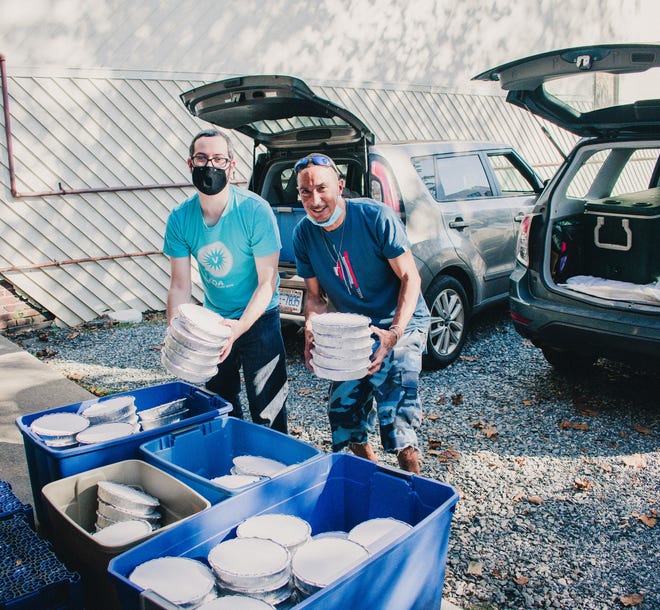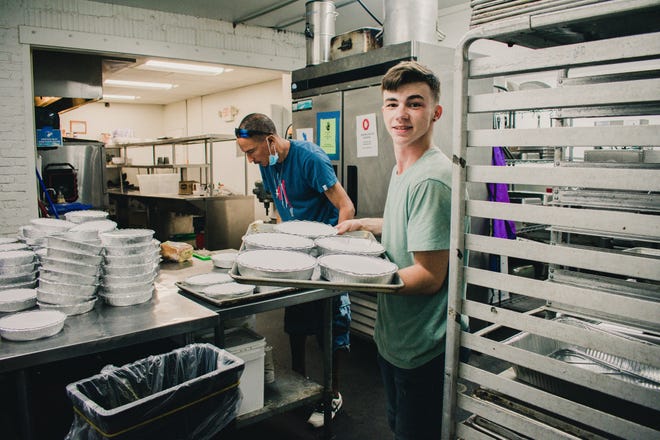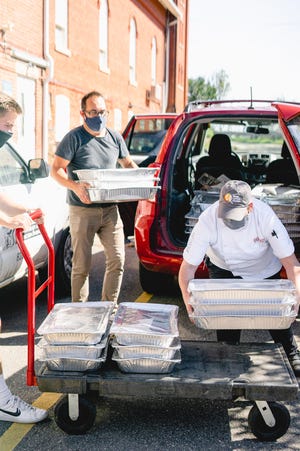Feed Our City helps keep Asheville restaurants in business, provides hot meals to locals
Mackensy Lunsford  | Asheville Citizen Times Even in the middle of a pandemic, Biscuit Head co-owner Carolyn Roy had extra hours to give her employees Nov. 9. A big...
-

- Rahul Chugh
- Nov 9, 2020
- 105
- 0

Even in the middle of a pandemic, Biscuit Head co-owner Carolyn Roy had extra hours to give her employees Nov. 9. A big catering order was coming in, and some of her crew would have to get to work earlier than usual.
This gig, a standing weekly order for the next few months, would send 150 scratch-made breakfast biscuits to the clients of Homeward Bound. And unlike the many food donations restaurants are accustomed to making, this job pays.
The locally founded Feed Our City program, launched Oct. 30 by the pandemic-born nonprofit Asheville Strong, uses grants and private donations to pay restaurants fair retail prices for relief meals.
More: From cocktails to toilet paper: Restaurants, bars, serve as markets during COVID-19
Roy said it helps provide more hours for her staff heading into an uncertain winter.
"No one knows what to expect," she said, noting that the usual September restaurant slump never materialized.
But with COVID numbers climbing and Biscuit Head still closed for indoor dining, there's no telling what the cold weather will bring.
"We don't know what's going to happen during the winter," she said. "All trends are out the window."
The standing Monday breakfast order adds a bit of stability in an unsettled time. "And it makes our employees feel good to be involved in this," Roy said.
How to Feed Our City
As COVID disrupted life in an unprecedented way in March, Asheville Strong launched to help businesses stay afloat with a simple plan: create a website where people could support then-closed restaurants by buying gift certificates.
More: Asheville Strong Fund launches to help local businesses owners through COVID crisis
But as the pandemic wore on, it became clear more needed to be done, so Catherine Campbell, the force behind the program's launch, decided to regroup, reconfigure and create even more meaningful change.
 First to launch was the Asheville Strong Fund, a microgrant program designed to support small business owners year-round.
First to launch was the Asheville Strong Fund, a microgrant program designed to support small business owners year-round.
And on Oct. 30, Asheville Strong announced the new Feed Our City initiative, which contracts with local restaurants to make and distribute hot meals to locals who need it.
The help is needed; March through June, more than 96,000 people sought food assistance monthly at MANNA FoodBank or a partner agency. With such strain on the system, extra hands can help make lighter work.
Feed Our City should provide up to 1,500 meals per week, or 6,000 meals per month, with a goal to feed a minimum of 30,000 county residents in the initial phase.
More: Asheville restaurants open for Thanksgiving: Where to get takeout, order meals, dine in
Campbell, now the president and treasurer of the Asheville Strong board of directors, said Feed Our City drew inspiration from World Central Kitchen, a worldwide relief kitchen led by super chef Jose Andres that's served 30 million meals and counting while paying back millions to the restaurants creating the food.
"We used that as a model to make something that was hyper locally focused," Campbell said. "Why reinvent the wheel with something that's clearly proven to work?"
 More: 150 Asheville restaurants express opposition to councilman's call for more restrictions
More: 150 Asheville restaurants express opposition to councilman's call for more restrictions
Feed Our City works on a micro-level, with local restaurants serving as relief kitchens for locals.
So far, three local restaurants have signed on — Cúrate, Twisted Laurel and Biscuit Head — with a fourth partner in the works. Further restaurants can be onboarded as funding allows.
"There are some other restaurants interested, but they're feeling really overwhelmed with both their business during leaf season and trying to figure out this problem of winter dining," Campbell said.
'Positively impacting restaurants'
Cúrate, which has worked in the past with World Central Kitchen, was a good match, since the Spanish tapas restaurant had long been linked with Haywood Street Congregation through its Welcome Table initiative.
The restaurant now makes 600 meals weekly with volunteers transporting the food from Cúrate's La Bodega storefront on Lexington Avenue to Haywood Street.
La Bodega Chef de Cuisine Matt Brown said the effort makes up about half of his work.
 Brown, originally hired as an event chef, quickly shifted gears as relief work under World Central Kitchen replaced in-house catering gigs. Since then, the give-back model has continued with Feed Our City.
Brown, originally hired as an event chef, quickly shifted gears as relief work under World Central Kitchen replaced in-house catering gigs. Since then, the give-back model has continued with Feed Our City.
Restaurants, often tapped to volunteer time and resources to serve the community, are in a position where they're unable to give back as freely as before, Brown said. But Feed Our City allows them to contribute in a sustainable way by reimbursing restaurants up to $10 per meal.
Each meal should have a healthy 6 ounces of protein and 4 ounces each of starch and vegetable per person. At Cúrate, that meant dishes like roasted Joyce Farms chicken with sofrito rice and sauteed zucchini.
"I do try to make the food broadly appealing, and we try to keep it interesting for ourselves and for the people eating it," Brown said.
 The chef has gotten positive feedback for dishes like pasta bolognese and brunswick stew. People particularly seem to like the cornbread, which turned out to be tougher to execute than expected for such a large group.
The chef has gotten positive feedback for dishes like pasta bolognese and brunswick stew. People particularly seem to like the cornbread, which turned out to be tougher to execute than expected for such a large group.
But Brown said that, while compliments feel good, the most gratifying piece is what Feed Our City does for the community at large.
"It's this virtuous circle where it benefits the restaurant in a sense that we're able to bring back staff and pay the bills, and on the other end of that is being able to feed people," he said. "And the fact that those two things are able to still be connected, even when restaurants are kind of broken, that's gratifying."
Local food for local people
Campbell has also involved the Appalachian Sustainable Agriculture Project to make sure local farmers, who have felt deeply the lost business the pandemic has wrought, also get a fair shake.
"Once the restaurant partners come on with us, we have them talk with (ASAP program director) Molly Nicholie," Campbell said. "ASAP can create that relationship between restaurants and farmers so they know they have resources."
Roy said ASAP has already contacted her husband and Biscuit Head co-owner Jason Roy to find more local food that fits the restaurants' wholesale budget as it goes forward with its Homeward Bound connection.
"It's just so incredible how this program is helping restaurants, helping farmers with ASAP's involvement and also feeding people who need to be fed," Carolyn Roy said. "Hopefully they'll get more funding to continue to get more restaurants involved to provide food for people and continue to employ their staff."
Learn more and donate to the program at www.ashevillestrong.com/feedourcity.
 Mackensy Lunsford has lived in Asheville for more than 20 years, and has been a staff writer for the Asheville Citizen Times since 2012. Lunsford is a former professional line cook and one-time restaurant owner.
Mackensy Lunsford has lived in Asheville for more than 20 years, and has been a staff writer for the Asheville Citizen Times since 2012. Lunsford is a former professional line cook and one-time restaurant owner.
About The Author - Aggregator
Rahul Chugh
You Might Also Like

-: Disclaimer :-
This article has been aggregated from citizen-times.com and they maybe/are the copyright owners of the same. If you are the Author/Copyright owner of this article and want us to remove the same then send an email to admin@blog.restaurant so that we can delete it immediately. We sincerely regret and apologies for any inconvenience caused to you due to the same. Though it is your decision but please take note that the link to your website and the article have been given above, within and on the bottom of the article.
Popular Posts
Recommended Posts
Random Posts
Voting Poll
Among these, which one is your favorite destination?
-
Among these, which one is your favorite destination?
Total Vote: 0
0 %
0 %
0 %
0 %
0 %
0 %
0 %
0 %
0 %
0 %
